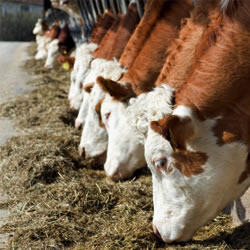The Nigerian livestock sector, grappling with inflationary pressures and supply chain disruptions, has found a renewed sense of optimism under the Ministry of Livestock Development, established by President Bola Tinubu in July 2024. Stakeholders across the industry, including prominent organizations like the Miyetti Allah Cattle Breeders Association of Nigeria (MACBAN) and the Commercial Dairy Ranchers Association of Nigeria (CODARAN), have expressed confidence in the ministry’s approach and its potential to address the longstanding challenges facing the sector. Despite the economic headwinds, they acknowledge the ministry’s early successes in restoring profitability and fostering stakeholder engagement, setting the stage for a more robust and resilient livestock industry.
One of the key achievements highlighted by MACBAN’s National Secretary, Aliyu Gotomo, is the ministry’s role in stabilizing the sector amidst rising prices and inflation. He noted that despite a 33% increase in ram prices compared to 2024 – with prices rising from N150,000 to N200,000 on average, and even reaching N1m in some regions – demand remains strong, demonstrating the underlying resilience of the market. This resilience is further underscored by the sector’s ability to withstand the impact of import restrictions from Niger Republic, a significant source of livestock for Nigeria. Gotomo credits the Minister of Livestock Development, Idi Maiha, for fostering an environment where domestic supply can meet national demand, even in the face of external disruptions. This, he argues, provides a valuable lesson about Nigeria’s potential for self-sufficiency and even export opportunities in livestock production.
Gotomo also commended the ministry’s focus on key policy areas that are driving optimism within the sector. These include the development of grazing reserves, improvements to pasture and water infrastructure, modernization of abattoirs, and enhanced market access. The modernization of abattoirs, in particular, is seen as a crucial step toward supporting multiple industries along the value chain. The minister’s attention to the dairy industry, where millions of liters of milk are lost daily due to inadequate processing capacity, has also been met with approval. These targeted interventions signal a commitment to addressing critical bottlenecks and unlocking the full potential of the livestock sector.
Muhammadu Abubakar, President of CODARAN, echoed the positive sentiment, emphasizing that while two years is too short a time to expect dramatic transformations, the ministry has provided a renewed sense of hope. Abubakar lauded Minister Maiha’s understanding of the livestock business and acknowledged the development of a strategic framework for growth across all subsectors – cattle, poultry, fishery, and dairy. He highlighted the inclusive approach adopted by the ministry, emphasizing the engagement of all stakeholders across the value chain. The World Milk Day celebration, where representatives from upstream, midstream, and downstream segments of the dairy industry came together to share their perspectives, was cited as a prime example of this inclusive approach.
While acknowledging the positive strides, Abubakar cautioned against unrealistic expectations. He emphasized that the livestock sector has suffered from decades of neglect, and it will take time for the ministry’s interventions to fully address these deep-seated challenges. He expressed confidence, however, that the policies being formulated, if implemented effectively, will lead to a transformed livestock ecosystem within a few years. This cautious optimism reflects the understanding that sustainable change requires a long-term commitment and consistent effort.
Both Gotomo and Abubakar stressed the importance of continuity in policy implementation for the long-term success of the ministry’s initiatives. They acknowledged that the journey towards a thriving and sustainable livestock sector will be a protracted one, but affirmed that the ministry’s current trajectory is promising. Their shared sentiment underscores the importance of sustained government support and consistent policy implementation to fully realize the potential of Nigeria’s livestock sector. The current positive momentum, they believe, represents a significant step in the right direction.
The consensus among stakeholders is that the Ministry of Livestock Development has instilled a newfound sense of direction and purpose within the sector. While challenges remain, particularly with regard to inflation and supply constraints, the ministry’s focus on strategic interventions, stakeholder engagement, and long-term planning offers a promising roadmap for future growth. The emphasis on developing grazing reserves, modernizing abattoirs, and enhancing processing capacity in the dairy industry signals a commitment to addressing critical bottlenecks and promoting sustainable practices. Despite the long road ahead, the early successes of the ministry have instilled confidence among stakeholders, who see the current trajectory as a positive sign for the future of Nigeria’s livestock sector.


